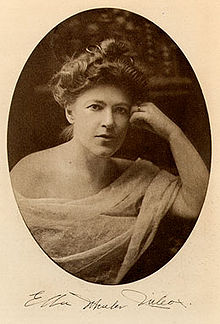C’est en gardant le silence, alors qu’ils devraient protester, que les hommes deviennent des lâches.
C’est en gardant le silence, alors qu’ils devraient protester, que les hommes deviennent des lâches.
[ Ella Wheeler Wilcox ]
To sin by silence when they should protest makes cowards of men – Protest, – « Poems of Problems », pp. 154–55 [ Ella Wheeler Wilcox ]

To sin by silence, when we should protest, Makes cowards out of men.
Protest, contained in « Poems of Problems », pp. 154–55 (1914). This quotation is often misattributed to Abraham Lincoln.
http://en.wikiquote.org/
C’est en gardant le silence, alors qu’ils devraient protester, que les hommes deviennent des lâches est une citation de Ella Wheeler Wilcox et non d’Abraham Lincoln.
Il s’agit d’une citation apocryphe (en anglais ou la traduction) souvent attribuée à Abraham Lincoln.
Voici le poème complet de Ella Wheeler Wilcox.
To sin by silence, when we should protest,
Makes cowards out of men. The human race.
Has climbed on protest. Had no voice been raised.
Against injustice, ignorance, and lust,
The inquisition yet would serve the law,
And guillotines decide our least disputes.
The few who dare, must speak and speak again.
To right the wrongs of many. Speech, thank God,
No vested power in this great day and land.
Can gag or throttle. Press and voice may cry.
Loud disapproval of existing ills;.
May criticise oppression and condemn.
The lawlessness of wealth-protecting laws.
That let the children and childbearers toil.
To purchase ease for idle millionaires.
Therefore I do protest against the boast.
Of independence in this mighty land.
Call no chain strong, which holds one rusted link.
Call no land free, that holds one fettered slave.
Until the manacled slim wrists of babes.
Are loosed to toss in childish sport and glee,
Until the mother bears no burden, save.
The precious one beneath her heart, until.
God’s soil is rescued from the clutch of greed.
And given back to labor, let no man.
Call this the land of freedom.
Ella Wheeler Wilcox, “Protest,” Poems of Problems, pp. 154–55 (1914).